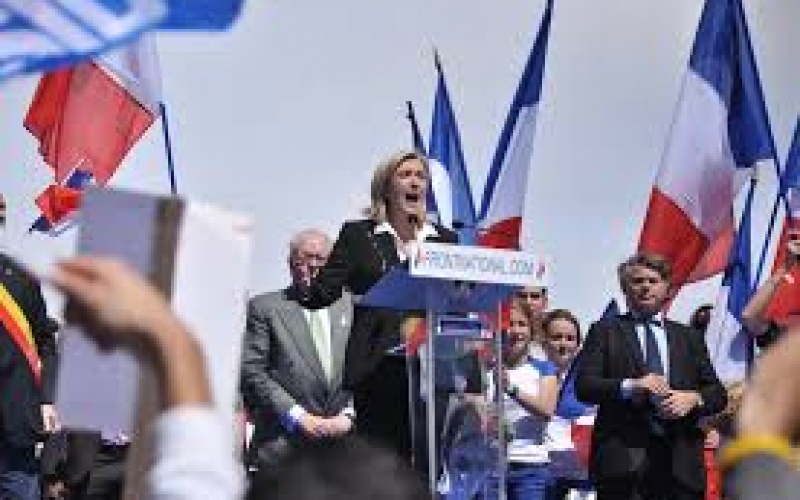The EU policy toward Russia and Ukraine is increasing Euroscepticism within national electorates. France and the Netherlands have shown just how the respective opposition to the current sanctions regime and the integration of Ukraine may lead to stronger anti-EU sentiments in Western Europe.

Recent developments highlight the growing rift between western European electorates and the European Union (EU) policy toward Russia, and Ukraine. Since 2014, the EU has been engaged in a far-reaching power play against Moscow. This led, among other measures, to the implementation of a sanctions regime against Russia and the push for ever closer ties with Kiev. This EU policy has generated backlashes in national economies and led to the rise of a specific euro-sceptic narrative forged on the opposition between national interests and EU priorities regarding Russia.
France: domestic interests trump EU policy goals
In France, the national economic situation is the key issue driving a wedge between domestic interests and the current EU policy in regard to Russia.
On April 28th, French lawmakers passed a non-binding vote in the National Assembly calling for the end of anti-Russian sanctions. The procedure was initiated by the centre-right Les Republicains (LR) party and was meant to spur the government to engage in a debate concerning the rationality of sanctions on Russia. It followed a call that Economy Minister Emmanuel Macron issued in January 2016 to lift EU sanctions against Russia. Macron’s objective was to end the sanctions regime against Moscow by the summer of 2016 in a bid to restore economic relations between France and Russia and enable the country’s export-oriented sectors to regain access to the lost market. A similar rationale pushed Prime Minister Matteo Renzi to call for a review of EU sanctions against Moscow in late 2015.
The vote built upon a strong opposition by some sectors of the French economy to the EU-wide policy in regards to Moscow. During nationwide protests held between July and September 2015, French farmers demonstrated against their dire economic situation. Protesters criticised the government for a multitude of reasons including heavy regulation and taxation that weigh heavily on their finances. The demonstrators also voiced a clear opposition to France’s participation in the EU sanctions against Russia that led to Moscow’s counter-measures. The latter have been having a major impact on the farmers’ export-driven meat and dairy production.
Within the first five months of 2015, the French agricultural sector lost tens of millions of euros because of the negative backlash of EU sanctions. Anti-sanctions protests held by European farmers took place throughout the EU in summer 2015 as labour unions’ officials claimed that the policy toward Russia costEuropean farmers approximately EUR 5.5 billion.
The Netherlands: opposition to the EU’s vision
On April 6th, the Netherlands held a referendum over the EU Association Agreement with Ukraine. The resultof the poll quickly became notorious within the pro-EU circles. It was a clear message of disagreement from a portion of the Dutch electorate in regards to the national government and the EU’s policy over Ukraine, and indirectly Russia. Approximately 60% of those voting expressed their opposition to trade agreements as well as a visa-free policy between the EU and Ukraine. While only over a third of Dutch voted, the result marked a tendency within certain portions of the western European electorate.
Euro-sceptics in the Netherlands and other European countries, such as France, see in the EU’s pro-Ukraine stance and its antagonism with Russia a position that counters national interests. The Dutch rejection of the EU deal with Ukraine is a watershed moment as it marks a clear fracture between parts of the national electorates and EU policies.
As the referendum was non-binding, it is highly likely that the Dutch government will proceed with its EU-oriented policy toward Ukraine. The EU has devoted too much political capital toward the integration of the eastern European country and may push through with its policy regardless. The European Commission already proposed a visa-free travel arrangement to Ukraine.
A fracture between policy and interests
The tensions sparked by domestic opposition to the EU policy in regards to Russia and Ukraine have potential wider implications within the EU. 2016 and 2017 have major electoral deadlines and Euro-scepticas well as nationalist parties are likely to use the rifts created by the divergence of interests between the national electorates and the EU to score strategic points.
The effect of an EU choice to override the message sent by Dutch voters, as well as the negative economic impact of Russian counter-sanctions, is likely to be felt at the earliest during the Brexit. April’s result in the Netherlands emboldened the UKIP position as its leader used it to highlight the overall western European discontent with Brussels policies.
Ahead of the 2017 presidential campaign, Marine Le Pen (Front National – FN), a strong supporter of President Vladimir Putin, is also likely to use the economic distress caused by the EU policy toward Russia in a bid to rally supporters against the LR and the Socialist Party pro-EU agendas.
sourche: http://globalriskinsights.com/2016/05/euroscepticism/
Δεν υπάρχουν σχόλια:
Δημοσίευση σχολίου